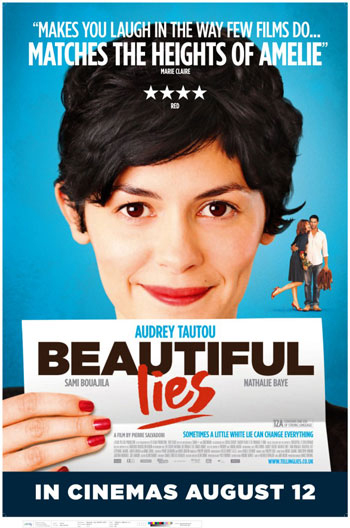Beautiful Lies ****
 After the hit 2006 comedy Priceless, writer/director Pierre Salvadori joins forces again with internationally acclaimed actress Audrey Tautou for another situational romantic comedy, Beautiful Lies (De vrais mensonges), looking at how misinterpretation and unfrequented love can bring a bittersweet but charming dose of humour.
After the hit 2006 comedy Priceless, writer/director Pierre Salvadori joins forces again with internationally acclaimed actress Audrey Tautou for another situational romantic comedy, Beautiful Lies (De vrais mensonges), looking at how misinterpretation and unfrequented love can bring a bittersweet but charming dose of humour.
Tautou plays 30-year-old Emilie, owner of a hairdressing salon who employs Jean (Sami Bouajila), a handyman who is secretly in love with her. Emilie has problems of her own; apart from her own cynical view of love and relationships, she wants to cheer up her mother, Maddy (Nathalie Baye), who still pines for her four-year-absent husband who lives with another younger woman. Emilie receives a passionate love letter one day, signed by an anonymous author (who is actually Jean), and terrified at seeing her mother fall deeper and deeper into despair, decides to concoct a crazy plan: she’ll change the name at the top of the letter and send it to Maddy to boost her confidence. Sadly, her good intentions but ill-thought-out plan backfires dramatically, causing more harm than good.
The concept behind Salvadori’s lively, funny and well-meaning comedy of errors of a letter that acts as a catalyst for drawing out everybody’s real intentions is classic Gallic cinema, full of quirky characters, consuming passion and deceit. Even though classed as a romantic comedy, it goes hand in hand with a much darker, uglier side that explores the consequences of one’s own vanity and pride, including Maddy’s personal triumph that manages to throw up an unexpected surprise.
Unlike Hollywood rom-coms, the reactions, rather than the actions of those caught up in Emilie’s web of lies provide the greatest laughs and deepest meaning to events. Salvadori film-making is not about intentionally producing laughs, but creating a natural humour that occurs from irony and total farce – in effect, nothing feels strained and false, even though a lot of his characters remain larger than life, almost theatrical in nature. In addition, all of his is characters all lack self-confidence, which exposes them to further confusion, misinterpretation and random acts of insanity. This makes them instantly obtainable through their obvious flaws and obsessions, and more redeeming when the truth is revealed.
Tautou who’s bubbly, head-strong character Emilie is nearly identical to her 2001 role of Amelie – played out in a similar shop environment – is the obvious choice for the role. Her angelic, pouting looks hide a scheming personality in all her portrayals, and even though she’s a little trendier and feistier than normal and hits the vodka bottle, she still looks innocent like butter wouldn’t melt, further endearing her to fans of both sexes.
But it’s Tautou’s pairing with Baye that provides the stage for most intriguing dynamics, as each character learns new sides – good and bad – to each other’s personalities. But Baye is the true comedic genius here, never rendering Maddy as totally pathetic, but providing viable credibility to her madness. However, Salvadori still cannot avoid some ‘mature woman’ mockery, even with an unexpected twist in the tail end, and even though he claims that he was exploring the realm of “someone loving and betraying another in the same breath”, based on Maddy’s actions towards her daughter, the ending still seems a little farfetched and daft, almost a letdown for such a strong character who we want to see a happy ending for.
Bouajila as Jean is the perfect, swooningly handsome but reserved romantic lead, biding his time, like a true Shakespearian hero, struggling to come to terms with his unfrequented love for Emilie, while being forced to deal with rejection, humiliation and deception, but with dignity and patience. Salvadori intentionally shows good and bad sides to each character, and even though Jean is initially portrayed as the victim, not all his actions are wholly without fault. It’s the altering goal posts that make continually make this deliciously entertaining and far from stereotypical and predictable in nature.
Beautiful Lies, like its namesake, explores the enticing but paradoxical outcome of telling good and bad fibs, and the poignant consequences on all its players, resulting in bringing the humour to the fore. Coupled with an exotic Mediterranean setting, Salvadori’s small pocket of volatile life, like in any soap opera, is intoxicating to watch and voyeuristic in nature – we watch events as does Emilie’s perplexed salon staff. The fascination is in the expressions, and like all good situational-driven French comedies, fully developed characters are inherent to heightening the pleasure and the absurdity – something that Salvadori is a master at.
4/5 stars
By @FilmGazer
WATCH THE TRAILER HERE